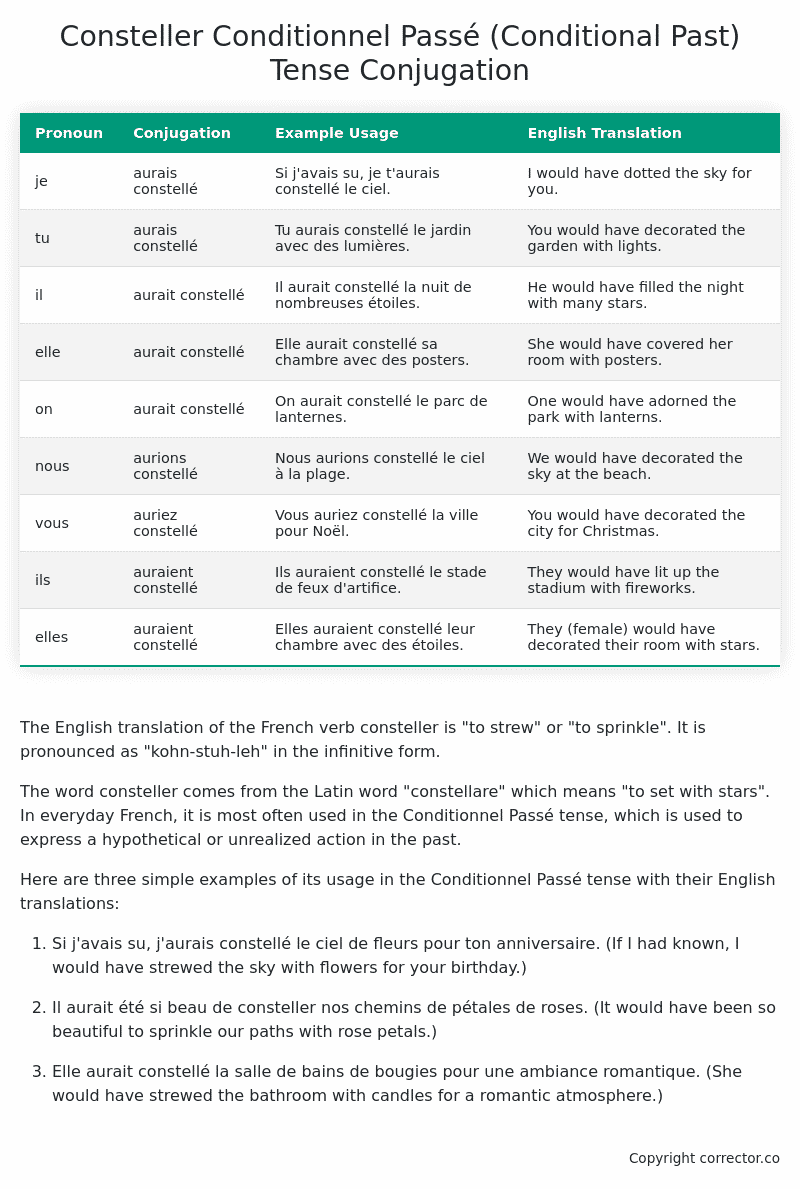Conditionnel Passé (Conditional Past) Tense Conjugation of the French Verb consteller
Introduction to the verb consteller
The English translation of the French verb consteller is “to strew” or “to sprinkle”. It is pronounced as “kohn-stuh-leh” in the infinitive form.
The word consteller comes from the Latin word “constellare” which means “to set with stars”. In everyday French, it is most often used in the Conditionnel Passé tense, which is used to express a hypothetical or unrealized action in the past.
Here are three simple examples of its usage in the Conditionnel Passé tense with their English translations:
-
Si j’avais su, j’aurais constellé le ciel de fleurs pour ton anniversaire. (If I had known, I would have strewed the sky with flowers for your birthday.)
-
Il aurait été si beau de consteller nos chemins de pétales de roses. (It would have been so beautiful to sprinkle our paths with rose petals.)
-
Elle aurait constellé la salle de bains de bougies pour une ambiance romantique. (She would have strewed the bathroom with candles for a romantic atmosphere.)
Table of the Conditionnel Passé (Conditional Past) Tense Conjugation of consteller
| Pronoun | Conjugation | Example Usage | English Translation |
|---|---|---|---|
| je | aurais constellé | Si j’avais su, je t’aurais constellé le ciel. | I would have dotted the sky for you. |
| tu | aurais constellé | Tu aurais constellé le jardin avec des lumières. | You would have decorated the garden with lights. |
| il | aurait constellé | Il aurait constellé la nuit de nombreuses étoiles. | He would have filled the night with many stars. |
| elle | aurait constellé | Elle aurait constellé sa chambre avec des posters. | She would have covered her room with posters. |
| on | aurait constellé | On aurait constellé le parc de lanternes. | One would have adorned the park with lanterns. |
| nous | aurions constellé | Nous aurions constellé le ciel à la plage. | We would have decorated the sky at the beach. |
| vous | auriez constellé | Vous auriez constellé la ville pour Noël. | You would have decorated the city for Christmas. |
| ils | auraient constellé | Ils auraient constellé le stade de feux d’artifice. | They would have lit up the stadium with fireworks. |
| elles | auraient constellé | Elles auraient constellé leur chambre avec des étoiles. | They (female) would have decorated their room with stars. |
Other Conjugations for Consteller.
Le Present (Present Tense) Conjugation of the French Verb consteller
Imparfait (Imperfect) Tense Conjugation of the French Verb consteller
Passé Simple (Simple Past) Tense Conjugation of the French Verb consteller
Passé Composé (Present Perfect) Tense Conjugation of the French Verb consteller
Futur Simple (Simple Future) Tense Conjugation of the French Verb consteller
Futur Proche (Near Future) Tense Conjugation of the French Verb consteller
Plus-que-parfait (Pluperfect) Tense Conjugation of the French Verb consteller
Passé Antérieur (Past Anterior) Tense Conjugation of the French Verb consteller
Futur Antérieur (Future Anterior) Tense Conjugation of the French Verb consteller
Subjonctif Présent (Subjunctive Present) Tense Conjugation of the French Verb consteller
Subjonctif Passé (Subjunctive Past) Tense Conjugation of the French Verb consteller
Subjonctif Imparfait (Subjunctive Imperfect) Tense Conjugation of the French Verb consteller
Subjonctif Plus-que-parfait (Subjunctive Pluperfect) Tense Conjugation of the French Verb consteller
Conditionnel Présent (Conditional Present) Tense Conjugation of the French Verb consteller
Conditionnel Passé (Conditional Past) Tense Conjugation of the French Verb consteller (this article)
L’impératif Présent (Imperative Present) Tense Conjugation of the French Verb consteller
L’infinitif Présent (Infinitive Present) Tense Conjugation of the French Verb consteller
Struggling with French verbs or the language in general? Why not use our free French Grammar Checker – no registration required!
Get a FREE Download Study Sheet of this Conjugation 🔥
Simply right click the image below, click “save image” and get your free reference for the consteller Conditionnel Passé tense conjugation!

Consteller – About the French Conditionnel Passé (Conditional Past) Tense
Formation
Common Everyday Usage Patterns
Expressing Unreal Past Scenarios
Polite Requests or Suggestions
Expressing Doubt or Uncertainty
Interactions with Other Tenses
Conditional Present
Indicative Past Tenses
Conditional Future
Summary
Want More?
I hope you enjoyed this article on the verb consteller. Still in a learning mood? Check out another TOTALLY random French verb conjugation!


